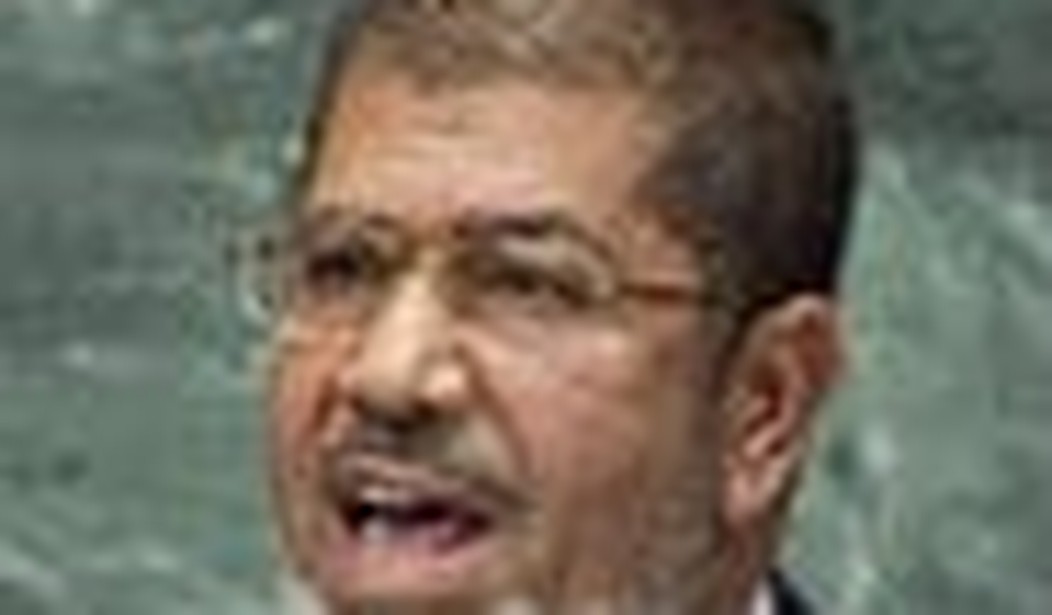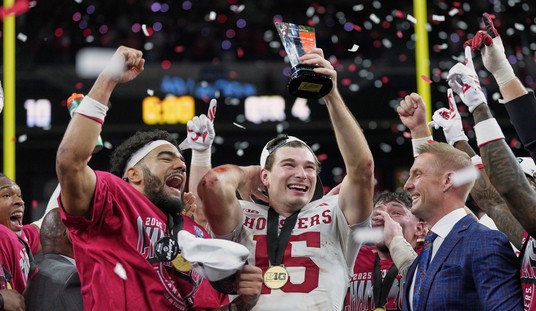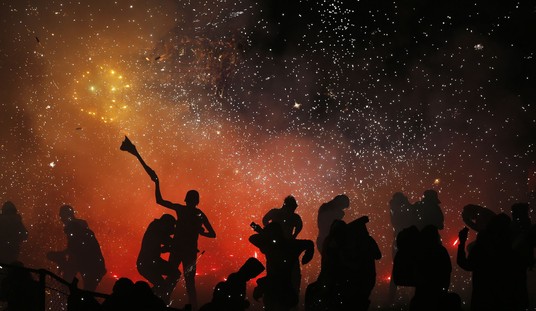The second day of the 67th United Nations General Assembly wasn’t as notable for its eighth visit — and rambling doomsday message — from Iranian President Mahmoud Ahmadinejad as it was for the Muslim Brotherhood leader on the dais for the first time.
Egyptian President Mohamed Morsi gave his plug for doomsday as well — just a few sentences into his address.
“God describes [Mohammad] in his Koran as a man of great morality. Also said that we have sent you as mercy for those who worship God. Our peace and prayers are on him, his soul, and all those who followed him until the day of doom — until doomsday,” he said.
But Morsi barely acknowledged the doom that protesters rained down on the U.S. embassy just a couple of weeks ago. Toward the end of his less-than-dynamic UN debut, he addressed the “unacceptable” behavior of insulting Islam.
“We expect from others as they expect from us: that they respect our cultural specificities and religious references and not to seek to impose concepts or cultures that are not acceptable to us or politicize certain issues and use them as a pretext to intervene in the affairs of others,” he said. “But Muslims and migrants are going through a number of countries in a certain number of regions in the world in terms of discrimination and violation of their human rights, and vicious campaigns against what they hold sacred is unacceptable.”
“And the insults hurled on the prophet of Islam, Mohammed, is rejected. We reject this. We cannot accept it,” Morsi added. “And we will be the opponents of those who do this. We will not allow anyone to do this by word or deed.”
While noting that Egypt would reject violence in objecting to “Islamophobia,” the president maintained that “the General Assembly as well as the Security Council has a main responsibility in addressing this phenomenon that is starting to have implications that clearly affect international peace and security.”
“The obscenities that I have referred to were recently released as part of an organized campaign against Islamic sanctities are unacceptable and require from us a firm stand. We have a responsibility in this international gathering to study how we can protect the world from instability and hatred,” Morsi said.
The newly elected leader spent the bulk of his speech, though, stressing his legitimacy and touting the revolution that saw the ouster of dictator Hosni Mubarak and created a new foothold for the once-banned Brotherhood.
Morsi said the Arab Spring had allowed all Egyptians “to claim a higher moral ground.”
“The legitimacy that I represent before you today was not the product of a fleeting moment or a brief uprising, nor was it the product of the winds of change of spring or autumn. Rather, this revolution and all the ones preceding it and following it in the region were triggered by a long struggle of genuine national movements,” he said, giving credit to the Brotherhood for Egypt’s new democracy.
He called for the Palestinians to have a state with Jerusalem as its capital and dug at Egypt’s partner in the longstanding peace treaty.
“It is shameful that the free world would accept that a party in the international community may continue to deny the rights of a nation that looks to independence over decades, no matter what justification,” Morsi said. “…I assure you of Egypt’s full support to any course of action Palestine decides to follow in the United Nations.”
Secretary of State Hillary Clinton met one-on-one with Morsi on Monday evening — “a very relaxed and warm meeting,” as described by a senior State Department official.
The official told reporters on background that the meeting began with Clinton thanking Morsi for providing security to the U.S. embassy in Cairo.
“We all understand that in the first hours, as the Egyptians themselves have said, it may have been a little slow, but indeed quite quickly Egypt provided to our embassy and has continued to provide to our embassy quite professional and quite effective security,” the official said.
He wouldn’t delve into Morsi’s response other than to say that the Egyptian leader “affirmed that embassy security is their duty, it’s their responsibility, and they take it quite seriously.”
When talking about the Muhammad video, they spoke about “how words, how acts, can become a reason that people take to act.”
“As you know, the president has spoken with President Morsi, so we’re sort of on to the next chapter in many ways.”
Obama called off a bilateral meeting with Morsi during his UN visit, and held no bilats before leaving town.
“The president spoke with President Morsi of Egypt at length very recently,” White House spokesman Jay Carney said Monday when asked if Obama called off the meeting to avoid sitting down with an Islamist during campaign season. “…He made clear in that conversation that he expects the government of Egypt and the governments of other regions in the — other countries in the region to abide by their obligations to provide security to diplomatic facilities that they host. And that’s a conversation he had with other leaders in the region.”
“I think what was gained is building a relationship which is going to be essential to cover the range of subjects that took place. I think to make sure that we are moving forward on all of the issues of concern that we have, whether it is embassy security, security in the region, ensuring that there are good channels of communication with Israel, to follow through on the commitments that Egypt itself has made, to talk about how they can move forward on their economic situation, because in fact they won’t be able to deliver for their people as a government unless, in fact, the economy starts moving forward,” the State Department official said.
“I think that President Morsi wanted to give us a sense of what they’re doing to try to move that forward. And that’s very important, because all of these pieces have to fit together as a package for them to, in fact, have the effect that we all hope to have to ensure a democratic Egypt.”
Like his Iranian counterpart, Morsi took time to do some American media while in town.
On CBS, Morsi was asked whether he considers the U.S. to be an ally.
“This is dependent on the definition of an ally. The understanding of an ally as a part of a military alliance, this is not existent right now,” he said. “But if you mean by ‘allied’ partnership and special diplomatic relationship and cooperation, we are that ally.”









Join the conversation as a VIP Member